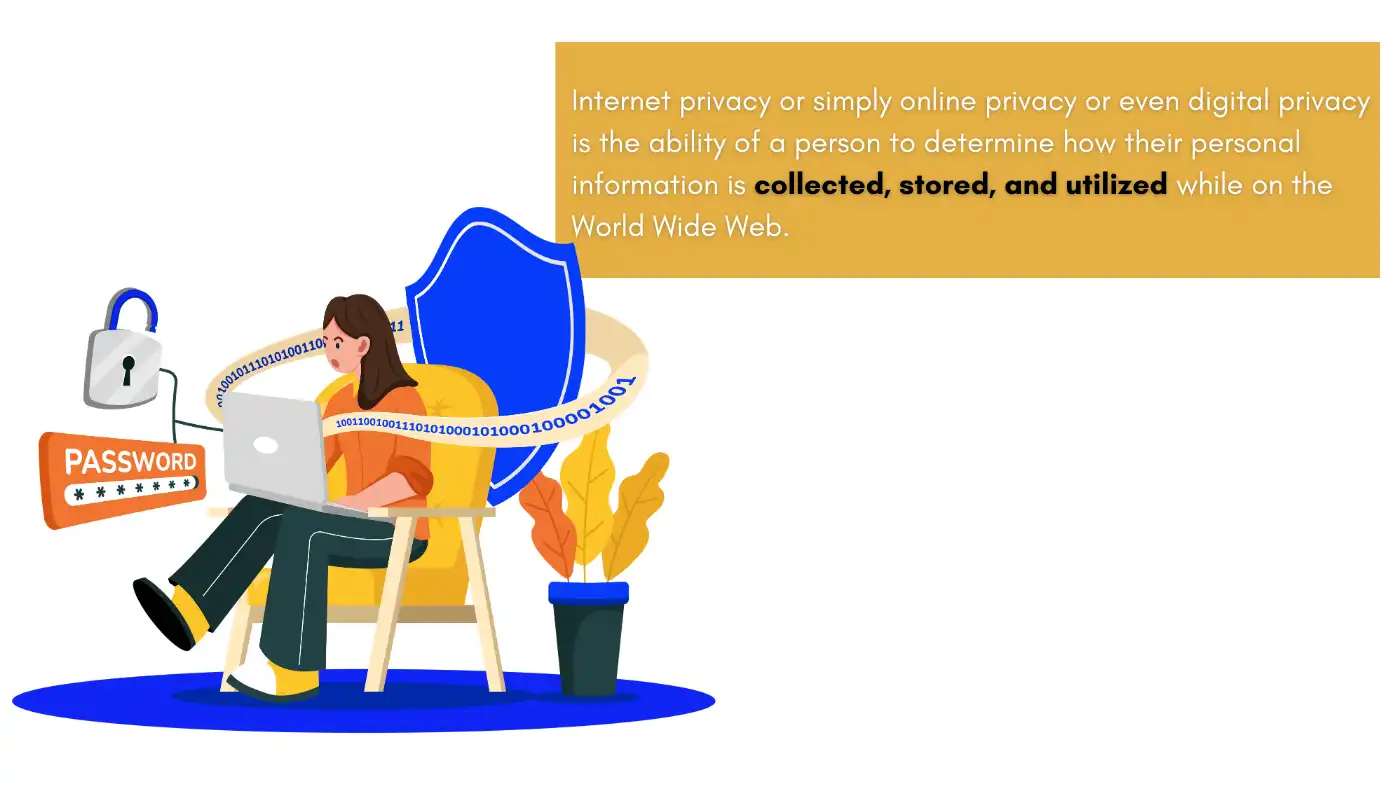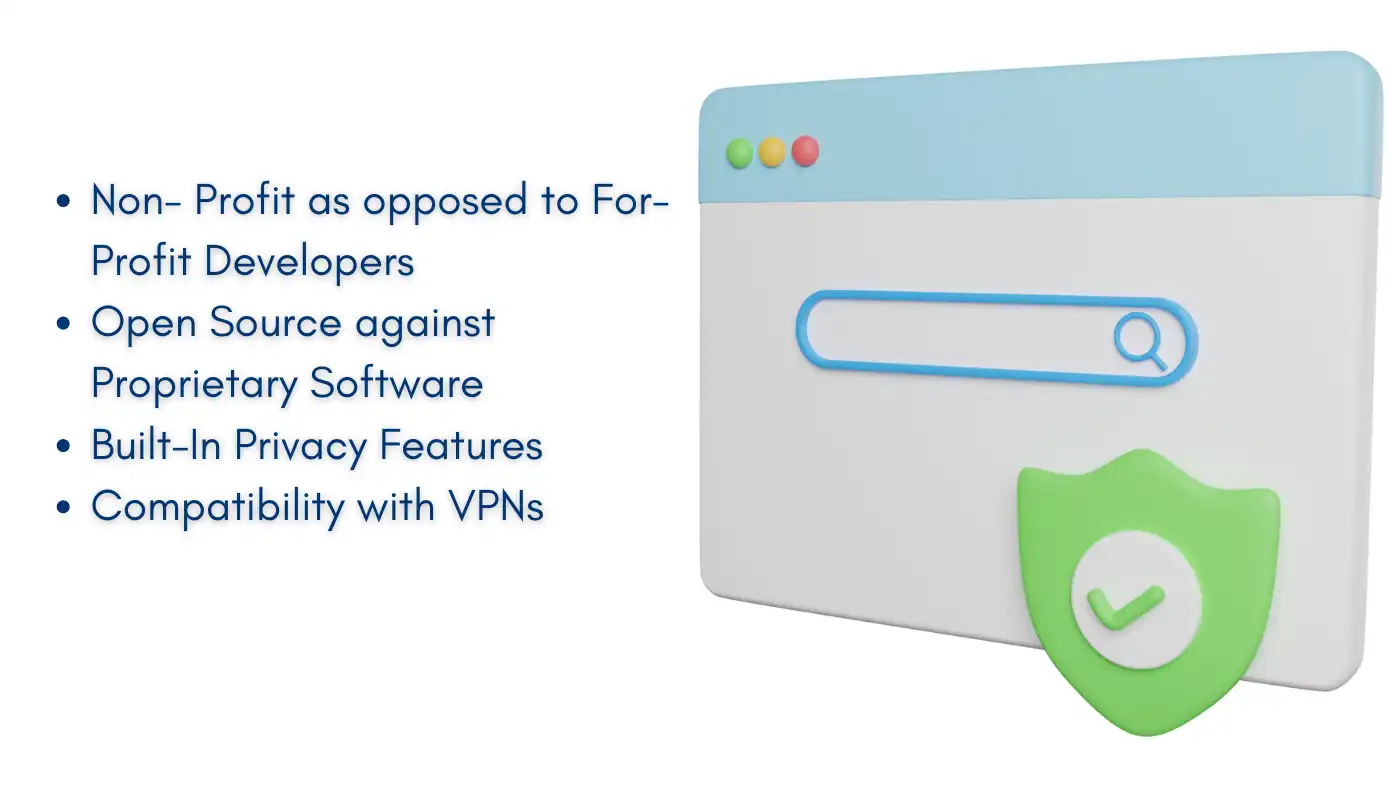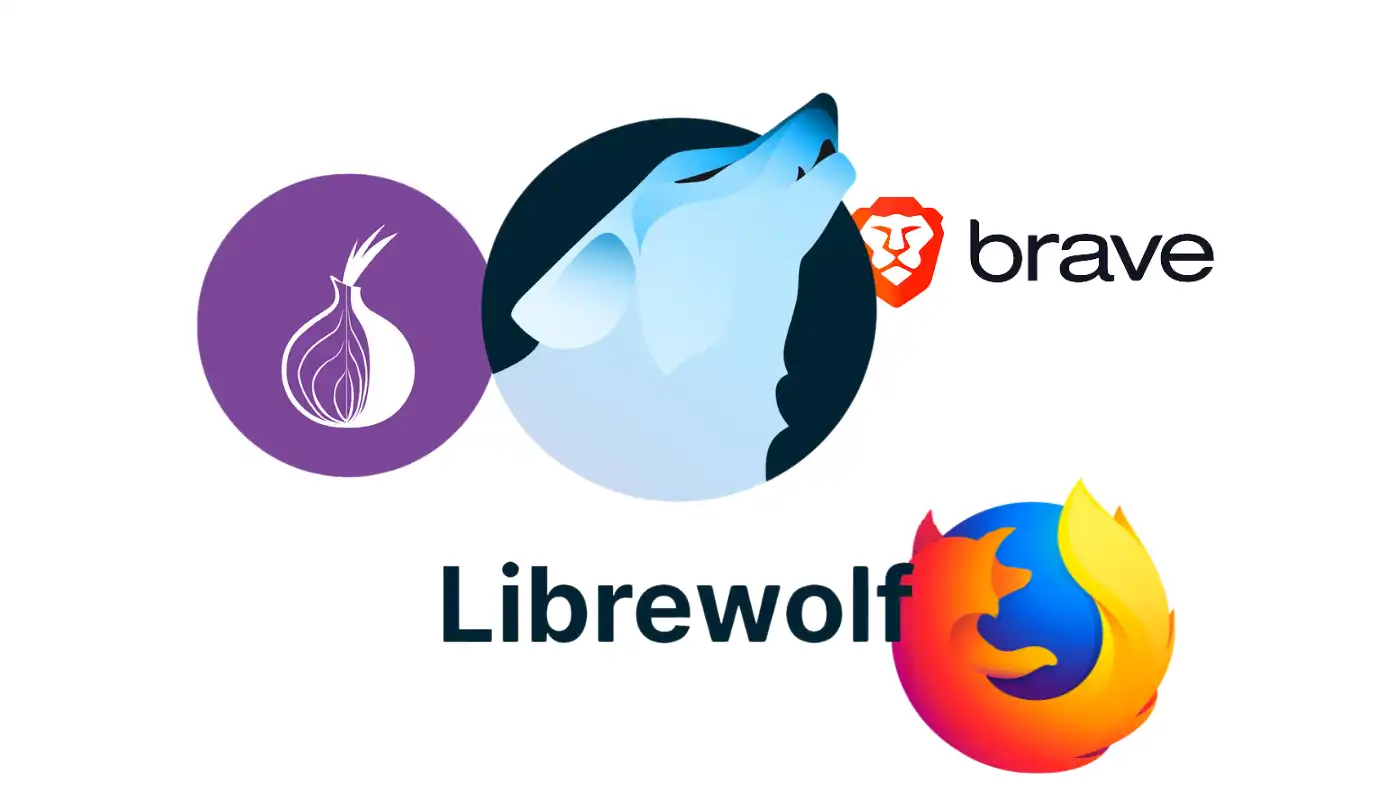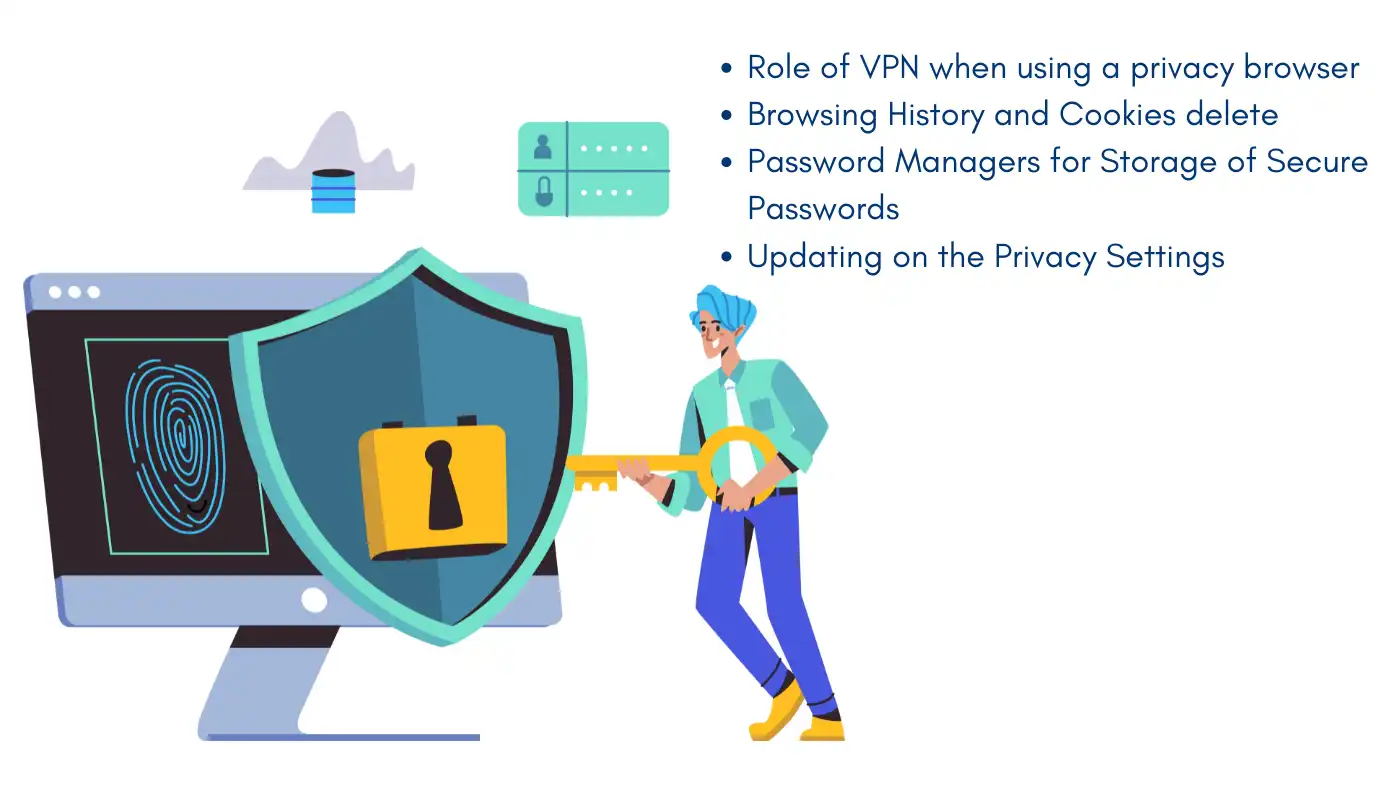As the curtains of privacy flow, especially on the internet, putting into consideration the right web browser is a crucial factor.
In this article, we bring the best browsers for privacy that consider the security of their users by having these capabilities; ad-blocking and tracking prevention among others, as encryption.
These browsers allow users to browse the Internet without the feeling of being watched or followed or having their data harvested.
In this guide, we will take a look at the best privacy-oriented browsers out there and explain to you what sets them apart as well as the advantages you will be able to get from them.
What is Internet Privacy?

Internet privacy or simply online privacy or even digital privacy is the ability of a person to determine how their personal information is collected, stored, and utilized while on the World Wide Web, addressing growing concerns about internet privacy issues.
It includes the capacity of endorsing what information is imparted, to whom it is imparted, and how such information is utilized by other Internet users.
One way to ensure this is by using the best browsers for privacy, which help minimize data collection.
Why Using the Best Internet Browser for Privacy Is Relevant
With such browsers, one will be in a position to increase the level of privacy while browsing the internet.
The best internet browser for privacy comes equipped with features like ad-blocking, tracking prevention, and advanced data encryption to ensure the users’ data is not harvested and used maliciously by third parties.
Currently, some of the most used browsers that prioritize their users’ privacy are Tor, DuckDuckGo, and Firefox with privacy extensions.
Rising Concerns that Stem from Internet Tracking and Surveillance
One of the most insidious dangers of using the internet is the fact that most websites, advertising providers, and government entities monitor and collect user data.
Profiling techniques such as cookie profiling and IP address tracking are some of the practices that enable the creation of individualized lists of users’ browsing habits.
These datasets are used in advertising marketing and have potential negative consequences when misused by hackers, fraudsters, among others.
Utilizing best browsers for privacy can further protect users from such invasive tracking and profiling techniques.
Furthermore, more and more governments, for example, the British, with the Investigatory Powers Act, can view people’s online activity thus violating their rights to privacy and freedom.
As a result, internet users have shifted to use what we find on the Internet – VPNs and other privacy protection programs.
Criteria For Evaluating Privacy-Focused Browsers

A. Non- Profit as opposed to For-Profit Developers
This is explained by the fact that the distinction of nonprofit and for-profit developers contextually contributes towards the determination of best private browsers.
It may be assumed that non-profit organizations might have a lower incentive in data collection compared to commercial entities because of an emphasis on user privacy and safety rather than financial profits.
On the other hand, working with for-profit developers, who may use people’s data to make money, privacy might be an issue.
It may be enlightening for users to know about the developer’s mission and goals and avoid providing vital information to untrustworthy browsers.
The best private browsers often emphasize transparency and ethical practices in data handling.
B. Open Source against Proprietary Software
Free browsers are considerably more approachable to this end since users can view the underlying source text.
This can in turn help to quickly find and fix such weaknesses. The best private browsers, like Firefox and Brave, have tilled their privacy features to be true since they are open source.
In contrast, proprietary software may keep some insights into the handling of data and privacy policies from the users.
To assess what a browser’s stance is when it comes to privacy, the propriety of a browser must be determined.
C. Built-In Privacy Features
Privacy-oriented browsers should thus have independent strong privacy tools integrated into the browser. These may include:
- Ad Blockers: Blocking invasive ads that may track the user’s connections.
- Tracking Protection: Preventing the third parties who track activities across websites.
- Cookie Management: Measure to prevent or control cookies primarily third-party cookies which are invasive of privacy.
- Private Browsing Modes: Tools such as incognito or private browsing in which browsing history or cookies are not stored.
These features bear the user’s capability of preserving privacy while surfing and should be among the criteria used to compare the best private browsers.
D. Compatibility with VPNs
Another criterion is the ability to connect to virtual private networks without unnecessary issues.
A privacy focused browser should permit the use of a VPN to improve the security of a user and their anonymity level.
VPN helps to protect internet traffic and hide orignal IP addresses; it makes it harder for trackers to monitor a user’s activity.
Web browsers that support VPN integration give users a chance to retain privacy while at the same time increasing convenience.

- Lightning-fast speeds to browse without lag
- Servers in 105+ countries around the globe
- Military-grade security to stay safe online
- Try it risk-free with its money-back guarantee
- Native apps for all major devices
Top Privacy-Focused Browsers

A. Brave
Overview of Features
Brave is a privacy focused browser built on the Chromium technology that is focused on users’ privacy as it blocks ads and trackers by default.
These include a feature called “Shields,” which integrates ad and tracker blocking where there are options to standard or aggressively block them.
It has its own browser extensions and features and a built-in privacy-preserving, low-fee Brave Private Tabs VPN, and Brave Rewards – cryptocurrency wallet with a search engine, Brave Search, that doesn’t track users.
The browser is supposed to prevent or control what a Web site does, how it behaves and which network connections it opens, especially the possibility to block third party ads and tracking.
Pros
- Excellent out-of-the-box privacy protection.
- It has quick performance because advertisements and trackers are removed during the browsing session.
- Encourages users to watch privacy-focused adverts, a notion that is supported by the current development of smart devices.
Cons
- Fewer possibilities for customization than many of the other browsers out there.
- Integrated VPN does not meet users who want to use other VPN services for any reason.
B. Mozilla Firefox
Overview of Features
Mozilla Firefox is an open-source browser that became popular because of its focus on the users’ privacy.
Hailed as ‘Enhanced Tracking Protection,’ it will allow the blocking of diverse sorts of trackers, including the social media trackers and cross-site cookies.
As one of the leading privacy focused browsers, Firefox is quite unique when it comes to the level of personalization that it offers to its users concerning the privacy settings.
Added to that, privacy has preset options, such as Standard, Strict, or Custom if the user wants more control.
Pros
- Can be extensively modified with different settings and includes many add-ons.
- There are many active development communities that will be enhancing these privacy features.
- It has a strong commitment to the user’s privacy.
- The page has no hidden agenda.
Cons
- Users need to know more technical know-how to fine-tune privacy options and features.
- Stylish and appealing design, creates complexity in user interface because of the numerous styles available.
C. Tor Browser
Overview of Features
As compared with other common secure web browsers, Tor Browser is primarily developed for anonymizing your connections.
It employs onion routing and the internet is layered through INVISV relay and a network of relays run by volunteers, making it almost impossible to track a user’s activities.
Ideal for journalists, activists, and anyone who has to stay anonymous while browsing the Internet.
Another thing is that now Tor Browser has some additional options like, for instance, automatic updates, an ad blocker integrated, and the security scalar which defines the level of anonymity.
Pros
- I am an advocate of strong anonymity that is achieved by forming a system of routing known as onion routing.
- For journalists and activists, it's indispensable to maintain their privacy in one way or another.
Cons
- Slower browsing speeds.
- Only some websites can limit or ban access for individuals that are using Tor.
D. DuckDuckGo Browser
Overview of Features
While DuckDuckGo is primarily named as a search engine that doesn’t track its users, it also released its mobile browsing application.
I really like the DuckDuckGo browser, because it does not allow third-party tracking and does not save any data from the user.
This specifically relates to secure web browsers like this one, as it is basically characterized by clear simplicity, limited number of options, and respect for a user’s privacy.
Pros
- A clean design and great emphasis on the user’s identity and identity protection
- An emphasis on data security with zero emphasis on user surveillance
Cons
- Lesser capability as compared to other bulky browsers
- Web browsers occupying small market share might hamper compatibility with some websites
E. Mullvad Browser
Overview of Features
Mullvad Browser is developed by the people behind the Mullvad VPN and is intended to boost privacy measures of its users.
It combines well with the Mullvad VPN, giving users a good platform through which they can surf the internet safely and anonymously.
The browser itself is designed for anonymous web browsing with minimal data leaks and provides improved user protection with such features as WebRTC leak protection and an in-built ad blocker.
Pros
- A very close integration with Mullvad VPN to enrich the customer privacy facet
- Powerful user privacy respect and the really no log policy
Cons
- There is a relatively low level of adaptation compared to other browsers, for instance MOZILLA APACHE
- Thus, a smaller number of users may have an impact on compatibility with some of the Web sites
F. LibreWolf
Overview of Features
As an extension of Firefox, LibreWolf comes with improved privacy by default, deleting telemetry from the browser and applying the strict tracking protection.
Firefox compatibility is supported; the tool underlines users’ ability to continue using Firefox extension while engaging in anonymous web browsing.
LibreWolf is committed to enhancing users’ privacy while browsing while at the same time delivering convenience.
Pros
- The privacy is stronger than Firefox because it meets the internet browser’s minimum standards of privacy.
- Support for Firefox extensions for Personalization.
Cons
- It provides less frequent updates than the official Firefox release, although not as shipped by Mozilla.
- The smaller the user base is, the less support will be coming from the users of the products.
Factors To Consider When Choosing A Privacy Browser

I. User Interface and Ease of use
In particular, the choice of the best browsers for privacy is based on the interface of the browser, as well as on the convenience of its usage.
Particularly, there are browsers which are developed to be as laconic as possible, and there are browsers which have more settings available to users.
Users should compare the manner in which the browser looks and the ease of using various aspects of the browser, particularly in setting privacy features.
The well-designed model can make it easier taking the benefit from the privacy of the browser.
B. What is the speed and the security
Some of the best browsers for privacy provide an affordability of fast browsing to the compromise of security.
When browsing certain browsers such as Tor, there is more emphasis on anonymity; hence they take a long time to load a page due to encryption and routing.
Some other browsers, like the Brave browser, are developed with the desire to be fast as well as to offer protection to their users by blocking adverts and the things that track them without much of a negative impact on speed.
For the users it is crucial to decide if they require speed more and if they are ready to accept slower browsing for additional protection against cyber threats.
C. Mobile Versions Compatibilities
Indeed, nowadays most users use mobile devices to connect to the internet, therefore the existence of a mobile version of the best browsers for privacy would be welcomed.
That said, DuckDuckGo and Brave browsers do have dedicated mobile applications that embody the same privacy solutions as the PCs.
Users need to make sure that their browser of choice is supported on the mobile platform that one is using and that the privacy features employed on the mobile version are as strong as those used by the desktop version.
D. Community Support and Resources for Troubleshooting
Another thing that may be really crucial when choosing the best internet browser for privacy is the availability of reliable support and materials that will help to solve possible problems.
Browsers with a larger user base, say Firefox, are likely to have better documentation, discussion forums, and support options.
Other less notable ones may not have many resources; as a result, it would be slightly difficult to work through some issues or seek answers to certain questions.
Users should also make their decision depending on the size and active members of the browser’s community.
Analyzing these aspects the users will be able to find out the most suitable private browsing tool satisfying their requirements without degrading the possibilities of using it.

Uninterrupted, high-speed browsing, zero logs so your online activity is always private.
Over 7000 people checked out NordVPN in the last month
Additional Privacy Measures

A. The role of VPN when using a secure web browsers
Privacy browsers are designed to combat tracking and data collection, and using a VPN adds another layer of protection.
A VPN hides the user’s identity on the Internet by providing an encrypted cover to protect their traffic, and thus their IP address will not be easily discovered by other parties that may be interested in monitoring the user’s activities online.
Almost all privacy-oriented browsers, including Mullvad Browser, are designed to work hand in hand with VPNs and secure web browsers to offer users the best privacy protection.
B. Browsing History and Cookies Delete
Clearing the browsing history, cached files as well as the cookies frequently would ensure that the storage space of the device is less used by the data.
This is especially useful if accessing the information using a PC that could be shared with other users and thus could be an open book to anyone.
It is easy to keep the browsing history clean because most privacy focused browsers afford controls to clear browsing data with ease using just one click.
C. Password Managers for Storage of Secure Passwords
Passwords should also be strong and also should not necessarily be the same for different websites since it is unsafe for strangers to access them.
So, password manager is an application that allows storing login information and automatically generating complex passwords, so that the same passwords that would have to be recycled are not needed to be remembered.
When using a password manager, it is possible to keep users’ accounts safe from malicious attackers with difficult passwords that the users themselves do not have to create and memorize.
D. Updating on the Privacy Settings
It is crucial for one who wishes to experience the full utility that a privacy focused browser has to offer to learn as much as he can about the privacy options and to always evaluate the browser for new updates sporadically.
Most of the browsers come with user-friendly privacy options to enable users to set privacy preferences depending on their preferences.
It is therefore important to keep updating the users on new features, security patches and even policy changes that affect the privacy of the users.
When used together with a privacy-conscious web-browser and the listed measures, the user’s total privacy on the Internet is considerably boosted.
Recent News Articles Related To The Best Internet Browsers For Privacy
The best browsers for your privacy in 2024
Another writer, Proton, in the article wrote about how one needs to select the web browser to safeguard his/her privacy, with a special focus on anonymous web browsing features.
The post presents a list of browsers with focus on the fact that several well-known ones are excluded, including Google Chrome and Safari because of reasons like proprietary system and data handling.
Some of the browsers suggested in the article include Firefox and Brave, which are open-source browsers with highly developed privacy tools, not forgetting the fact that the browsers disclose how they utilize users’ data.
It also discusses how the users have become conscious about the need to use browsing solutions that do not compromise on the detection of tracking as this activity gains popularity online.
Privacy-Focused Browser Settings: Here is what businesses need to know.
An article on Fingerprint.com analyzing why the usage of private browsers such as Brave.
Tor, and Firefox has increased with people having more awareness of their online privacy and the importance of anonymous web browsing.
There are features like tracker blocking, fingerprinting protection, and strict cookie management, which are discussed to exhibit how these browsers help in increasing user privacy.
The article also states that as convenient as these privacy attributes are, their usage can be sorely taken advantage of by fraudsters to evade fraud detection, hence the importance of businesses being on the lookout for such privacy effects.
The Most Private Browsers For Privacy in the year 2024
The article that I found in the ZDNet offers the readers an expert guide to the most secure browsers for privacy in 2024.
It even gives young people an instinct to choose a browser that respects users’ privacy and is also good for user experience.
The discrete ranking raises Brave as the best browser due to its all-round privacy features such as ad tracking and strong privacy settings.
It is also recommended for the improved tracking protection and for the frequent update of the browser in a bid to come up with better features in the privacy bracket.
The article in particular emphasizes the responsibility that users have for protecting their personal data while using the internet that one has to choose the right browsing tools.
FAQs
What is the rationale behind using a privacy oriented browser?
What you should consider in a privacy-focused browser?
Was Tor the most private one in terms of web browsers?
Can I use any browser with a VPN for more privacy?
Is there anything wrong with using privacy browsers?
Conclusion:
Thus, choosing a browser that prioritizes privacy is critical to protecting the interactions on the web and your data from prying eyes.
Looking at examples of the best browsers for privacy, such as Brave, Firefox, and Tor, the users can improve their anonymous browsing and avoid tracking.
Being more private-oriented while being online is especially crucial in the current context of increasing data use for a more secure web experience.






